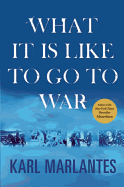
Widely praised as one of the best novels written about the Vietnam War, Karl Marlantes's 2010 debut, Matterhorn, was packed with heartrending scenes inspired by his experiences as a young Marine. In What It Is Like to Go to War, Marlantes reveals the intimate details of the real-life moments he fictionalized for Matterhorn and skillfully deploys them to support his call for a paradigm shift in how we prepare soldiers for combat.
"The Marine Corps taught me how to kill, but it didn't teach me how to deal with killing," he writes. Citing Homer, Jung, the Bible and the Bhagavad Gita, among other thinkers and texts, Marlantes contends that "compassion must be elicited consciously in warfare" and suggests that we incorporate mindfulness training into combat preparations and discourage warriors from depersonalizing the enemy. He emphasizes the necessity (and current dearth) of post-combat rituals to demonstrate respect for the lives taken during battle, and recalls how the men in his unit wept as they obeyed his order to bury an enemy soldier after a particularly brutal encounter. Marlantes also recommends the implementation of mandatory counseling to prevent post-traumatic stress disorder, remove the stigma of needing help and enable veterans to rejoin their communities successfully.
What It Is Like to Go to War can be read as both a letter to young warriors and as a catalyzing call for change. But this is not a book about politics; it is about humanity. Using his own experiences to provide context, Marlantes advances, with startling openness, a revolutionary strategy to preserve the humanity of those who fight for our nation and to honor the humanity of those they kill. --Rebecca Joines Schinsky, blogger at The Book Lady's Blog

